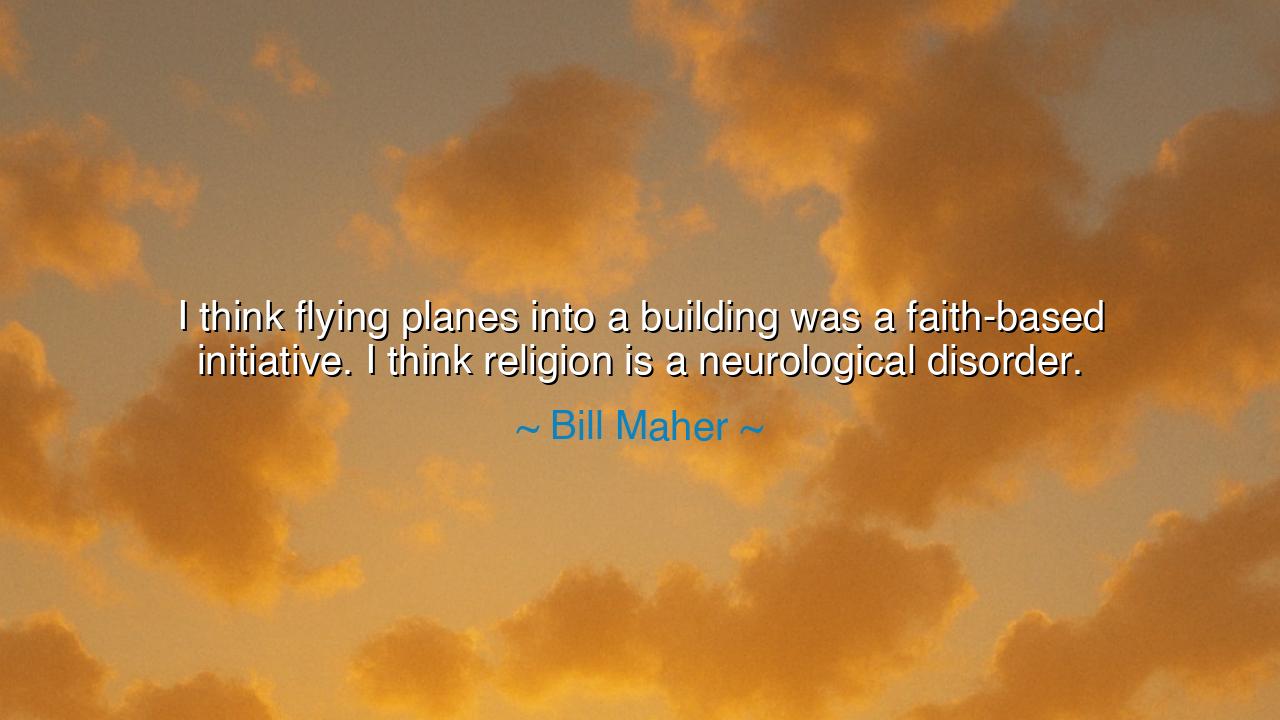
I think flying planes into a building was a faith-based
I think flying planes into a building was a faith-based initiative. I think religion is a neurological disorder.






In the echoes of human history, where the struggles of the soul and the mind often collide, the words of Bill Maher stir deep reflection: "I think flying planes into a building was a faith-based initiative. I think religion is a neurological disorder." These words cut through the veil of accepted narratives, challenging us to confront the darker side of religion—a side where faith is twisted into violence and extremism. Maher’s statement is a bold critique of religion as a force that can sometimes drive individuals to commit acts of unimaginable harm, using the 2001 terrorist attacks as a stark example. Here, faith, in its most distorted form, becomes the justification for violence, posing a fundamental question about the role of belief in the human psyche and society.
To understand Maher’s words, we must look to the ancient world, where the tension between faith and reason has long been a central theme. Plato, in his dialogues, often wrestled with the concept of belief and how it shaped human behavior. He understood that faith could serve as a guide to the highest truth, but also warned against the dangers of blind faith—a faith that could be manipulated for purposes of control and destruction. Aristotle, too, believed that human behavior should be guided by reason and virtue, and he feared the dangers of irrational beliefs that could lead people astray. The philosophers of antiquity recognized that faith could either elevate the human spirit or, when distorted, lead to chaos and harm. Maher’s words echo this ancient skepticism, questioning whether religion, in its most dogmatic forms, can cause more harm than good.
Consider the tragic example of the crusades in the Middle Ages, where religious fervor was used as a justification for brutal violence. These wars, fought in the name of God, were some of the most destructive and bloodthirsty conflicts in history. Thousands of lives were lost, all in the name of a faith that was manipulated to serve the political and territorial ambitions of rulers. The soldiers believed they were serving a divine purpose, yet their actions were driven by human greed and power, not by true spiritual enlightenment. This misuse of religion—turning faith into a weapon of destruction—serves as a powerful example of how religion, when it becomes detached from reason and compassion, can be twisted into something that breeds violence rather than peace.
In modern times, we see similar examples of faith being used to justify violence, particularly in the rise of religious extremism. Al-Qaeda, responsible for the 9/11 attacks, espoused a warped interpretation of Islam that led to the deaths of thousands. Here, religion became not a force for peace, but a tool for manipulation, where belief in a divine cause was used to justify horrific acts of terrorism. This distortion of religion, where people are willing to sacrifice their lives and the lives of others, is what Maher points to when he refers to religion as a neurological disorder—a belief system that overrides rationality and fosters a dangerous kind of mental programming. In this context, religion ceases to be a force for enlightenment and becomes instead a mechanism of control and destruction.
The lesson that Maher’s words offer is a cautionary tale about the potential dangers of blind faith—the kind of faith that demands unquestioning adherence and can be used to manipulate people into committing acts of violence. It is a reminder that religion, like any other powerful force, can either elevate or diminish humanity. When it is used to foster compassion, justice, and understanding, it can unite people and transform societies. But when it is hijacked by those with agendas of power and domination, it can become a tool of oppression and destruction. Maher’s challenge, then, is not to reject faith or religion outright, but to engage with it critically, ensuring that it remains aligned with humanity's highest ideals.
In our own lives, we are called to question and reflect on the role that faith plays in shaping our thoughts, actions, and interactions with others. We must strive to practice a faith that is rooted in compassion and understanding, and that leads to actions which promote peace, justice, and unity, not division and violence. It is not enough to follow tradition blindly; we must examine the beliefs we hold and ask whether they lead us toward truth and love or toward hatred and destruction. True spirituality is a force that should inspire the best in us, guiding us toward a deeper connection with one another and the world around us.
Therefore, let us embrace faith not as a tool of control, but as a guiding light for goodness and reason. Let us act with wisdom, grounded in compassion and the understanding that religion—in its highest form—is meant to bring out the best in humanity. As Socrates once said, “Know thyself,” and in knowing ourselves, we must also recognize the danger of blind obedience to any belief system that seeks to control or destroy rather than uplift. Let us live with the knowledge that true faith is not blind—it is alive, critical, and full of compassion, a force for healing and unity, never for harm.






AAdministratorAdministrator
Welcome, honored guests. Please leave a comment, we will respond soon